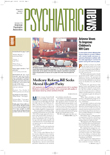There’s good news and bad news from the national resident matching program this year: the number of American medical students matching into psychiatry is up—but the number of international medical graduates, upon whom the field has increasingly relied in recent years, is down.
A total of 524 graduates of U.S. medical schools chose to enter psychiatry residency programs this year—a 9 percent increase over 2000 and the largest annual increase since 1991.
“We’re delighted with the increased interest in psychiatry shown by fourth-year medical students in the U.S.,” said James Thompson, M.D., director of APA’s Division of Education, Minority, and National Programs. “We certainly hope that APA’s increased involvement in medical student organizations over the past year was a deciding factor in the increased residency matches for psychiatry.”
Nyapati Rao, M.D., chair of the Council on Medical Education and Career Development, echoed the sentiment. “APA and its Committee on Medical Student Education, chaired by Michael Vergare, M.D., has worked closely with other psychiatric education organizations to provide students with positive exposure to the field,” he reported. “This has been accomplished largely by attending meetings of medical student organizations. We hope to work more closely with medical students and student organizations in the future, to send the message that psychiatry is the most exciting specialty in medicine.”
At the same time, however, the number of foreign-trained students who matched in psychiatry dropped from 312 in 2000 to 277 this year. Of those, 198 are non-U.S. graduates of foreign medical schools, according to the match results.
Some leaders say the decrease may be related to the recently implemented Clinical Skills Exam (CSE). The exam is designed to assess clinical competencies, including language proficiency, through a series of tests that include simulated encounters with patients. The exam is given only once a year in Philadelphia, an expensive and time-consuming process that some say makes it all but impossible for many IMGs to even qualify for an American residency program.
“The problem isn’t passing the exam,” said Deborah Hales, M.D., director of APA’s Department of Education and Career Development. “International graduates often do not have access to the exam, since it’s only given in Philadelphia.”
Hales noted that if the downward trend in IMGs entering psychiatry were to continue, it could pose a problem for the field in the future. The Council on Medical Education and Career Development met to discuss this problem in February, she said, and is formulating a plan to address the issue.
“IMGs comprise almost half of our psychiatry residents and are an important part of our psychiatric workforce in the U.S.,” she said. “We remain concerned that we recruit the highest-quality physicians into psychiatry, whether USMG or IMG. If the decline in IMGs continues, we will have to give attention to the recruitment of international medical graduates as well as American graduates to ensure adequate access to psychiatric care.”
The total number of psychiatry residents has remained steady for several years at about 6,000. This includes general psychiatry residents, as well psychiatry residents in subspecialty training. Participating in the 2001 match were 179 general psychiatry programs, which filled 93 percent of their first-year residency positions. The “fill” percentage has hovered between 89 percent and 94 percent over the last five years.
Meanwhile, outside of psychiatry the news from this year’s match is the steep decline in students entering family practice and the increase in students entering anesthesiology and radiology. Both of those fields experienced dramatic declines during the 90s, when the emphasis on primary care was at its height.
Now, they are on the rebound. Sydney Weissman, M.D., a member of the APA Committee on Workforce Issues, said that the news forebodes a return to interest in specialty medicine among medical students.
Weissman believes that students have come to perceive family practice as filling a “gatekeeper” role in HMOs—a role that few students want to spend their careers playing. There’s a lesson here for psychiatry, he said. “If psychiatrists wind up being the psychiatric medication suppliers and do not deal with the totality of the patient, we will become the gatekeepers of mental health, akin to primary care gatekeepers.” This could hurt students’ interest in psychiatry.
This year’s match results also show, Weissman said, “a reordering of medical student interest. It tells me that students are extremely aware what each field of medicine is about and what the opportunities are.” ▪
